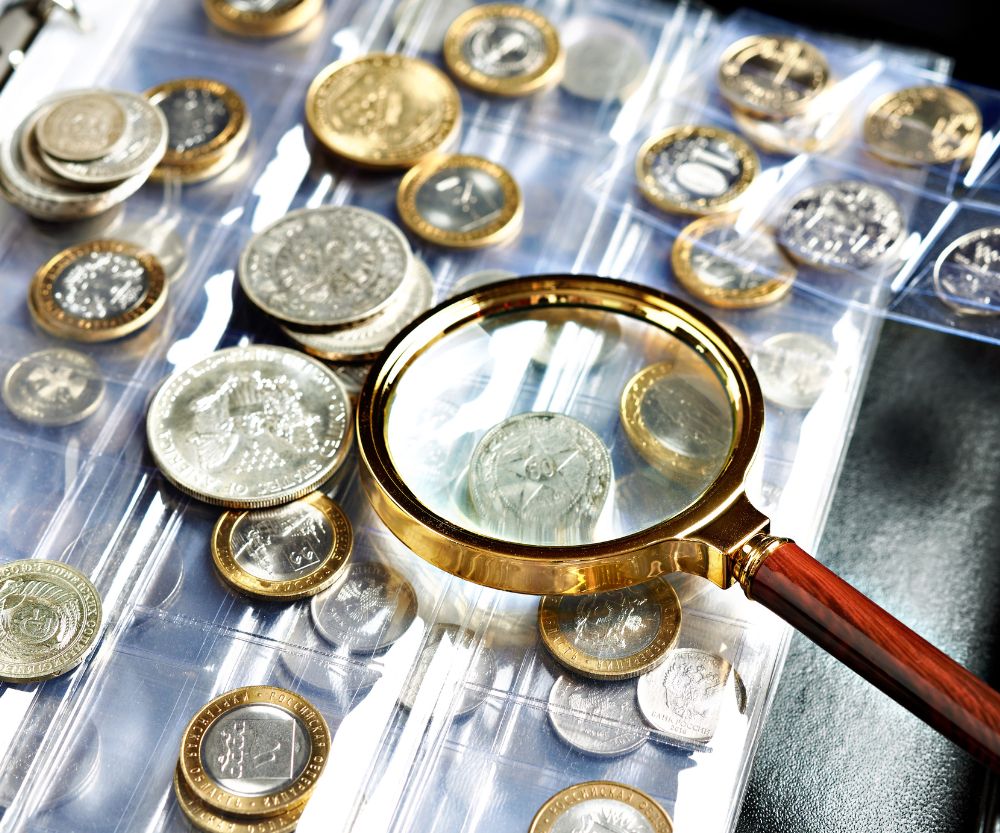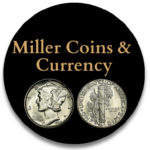Miller Coins and Currency Coin dealer
in-person appointment
Choosing the Right Coin Dealer: A Guide to Buying, Selling, and Valuing Coins
Are you ready to embark on a journey of discovering the world of coins? Look no further, for this guide will be your compass, leading you through the intricate web of buying, selling, and valuing coins.
From the fascinating history of coin dealing to the art of coin grading, this article will equip you with the knowledge needed to make informed decisions.
So, fasten your seatbelt and get ready to delve into the captivating realm of coin collecting.
History of Coin Dealing
When it comes to the history of coin dealing, you’ll find that it dates back centuries. Coin dealers have been around since ancient times, serving as intermediaries between buyers and sellers of coins.
These individuals play a crucial role in the world of numismatics, the study and collection of coins. Throughout history, coin dealers have been responsible for buying, selling, and valuing coins, helping collectors and enthusiasts alike to build their collections.
They possess a deep understanding of the market, historical significance, and rarity of different coins. By leveraging their expertise, coin dealers ensure that buyers get fair prices and sellers receive accurate valuations.
Understanding the history of coin dealing is essential in navigating the world of numismatics, as it provides a foundation for identifying trusted dealers and making informed decisions when it comes to buying, selling, and valuing coins.
Transitioning into the next section about ‘types of coins,’ it’s important to note that coin dealers specialize in a wide range of coins, each with its own unique characteristics and value.
Types of Coins
You’ll find a wide variety of coins available for collectors, including rare and commemorative ones. When it comes to buying, selling, and valuing coins, it’s important to understand the different types that are out there.
One of the most common types of coins is the circulation coin, which is used as legal tender. These coins are often made from base metals such as copper or nickel.
Another type of coin is the commemorative coin, which is issued to honor a specific event or person. These coins are often made with precious metals like gold or silver and are highly sought after by collectors.
Additionally, there are rare coins, which are scarce and highly valuable due to their rarity and historical significance.
When dealing with coin dealers, it’s essential to find someone knowledgeable and reputable to ensure you’re getting accurate valuations and fair prices for your coins.
Coin Grading
To accurately assess the quality and condition of your coins, it’s important to understand the process of coin grading. Coin grading is the evaluation and classification of coins based on their physical condition, rarity, and overall appeal.
Here are three key points to consider when it comes to coin grading:
- Grading Standards: Coins are graded on a scale from poor to perfect, with specific criteria for each grade. Understanding these standards will help you accurately assess the value of your coins.
- Factors Affecting Value: The condition of a coin, its rarity, and demand in the market all play a role in determining its value. A coin in excellent condition and high demand will command a higher price.
- Professional Grading Services: Seeking the expertise of professional grading services can help ensure accurate and unbiased grading of your coins. These services provide a certification that adds credibility and value to your coins.
Coin Collecting
If you’re passionate about numismatics, collecting coins can be a rewarding hobby that allows you to appreciate history and artistry.
When it comes to buying, selling, and valuing coins, finding a trustworthy coin dealer is crucial. A reputable coin dealer can provide guidance, expertise, and fair prices for your collection. They’ve expert knowledge of different coin types, mint marks, and grading systems.
A good coin dealer will also be able to accurately assess the value of your coins, taking into consideration factors such as rarity, condition, and market demand. They can help you navigate the complexities of the coin market, ensuring that you make informed decisions when buying or selling.
Coin Authentication
When assessing the authenticity of a coin, it’s important to look for key indicators such as mint marks, weight, and edge lettering. These factors can help you determine whether a coin is genuine or a counterfeit.
Here are some important things to consider when it comes to coin authentication:
- Mint Marks: Check for the presence of mint marks, which are small symbols or letters indicating the mint where the coin was produced. Different mints may have different mint marks, so familiarize yourself with the marks used for specific coins.
- Weight: Compare the weight of the coin to the standard weight for that particular coin. Counterfeit coins often have slight weight variations, so using a precise scale is crucial.
- Edge Lettering: Examine the edge of the coin for any inscriptions or lettering. Certain coins have specific edge designs or lettering, so any discrepancies could be a sign of forgery.
Coin Pricing
Remember, understanding current market trends and researching recent sales can help you determine the value of your coins. When it comes to coin pricing, it’s important to consult a reputable coin dealer who’s a deep knowledge of the market. A coin dealer can provide you with an accurate valuation based on factors such as rarity, condition, and demand. They can also guide you in buying or selling coins at fair prices. Coin pricing can vary greatly depending on these factors, so it’s crucial to do your due diligence and seek professional advice.
Coin Investment
To make the most of your coin investment, it’s essential to stay informed about market trends and seek guidance from experts in the field. When it comes to buying, selling, and valuing coins, a reputable coin dealer can be your best ally. Here are some reasons why finding the right dealer is crucial:
- Expertise: A knowledgeable coin dealer can provide valuable insights and advice, helping you make informed decisions about your investment.
- Authenticity: With the rise of counterfeit coins, a trusted dealer can ensure that the coins you buy or sell are genuine and accurately graded.
- Access to rare coins: A reputable dealer often has access to a wide range of rare coins, allowing you to expand your collection and potentially increase its value.
By partnering with a reliable coin dealer, you can navigate the world of coin investment with confidence and maximize your returns.
Now, let’s explore another exciting aspect of the coin collecting community: coin shows.
Coin Shows
Attending a coin show can provide you with a unique opportunity to connect with fellow collectors and explore a wide variety of coins. Coin shows are events where numerous coin dealers gather to showcase their collections and offer buying, selling, and valuing services.
These shows are a great platform to interact with knowledgeable coin dealers who can guide you in making informed decisions. When buying coins at a show, take your time to examine the quality, rarity, and historical significance of the coins.
Coin dealers can provide valuable insights and help you determine the fair market value of the coins you’re interested in selling. They can also assist in valuing your collection or individual coins, ensuring you receive a fair price for your investments.
Coin Storage
Storing your coins properly is crucial to maintaining their condition and preserving their value. Here are some tips to help you store your coins effectively:
- Use coin holders: Coin holders provide protection from scratches, dirt, and moisture. They come in various types such as cardboard flips, plastic flips, and capsules. Choose the one that suits your needs and budget.
- Avoid PVC: PVC is a common material used in some coin holders, but it can react with the coins and cause damage. Look for holders labeled as PVC-free to ensure the safety of your coins.
- Control the environment: Store your coins in a cool, dry place with stable temperature and humidity levels. Avoid areas prone to extreme temperature changes or high humidity.
By following these storage guidelines, you can ensure that your coins remain in excellent condition and retain their value.
If you’ve any questions or need further assistance, consult a reputable coin dealer who can provide expert advice on buying, selling, and valuing coins.
Coin Cleaning
If you want to clean your coins, it’s important to use gentle methods and avoid harsh chemicals or abrasive materials. Cleaning your coins can help restore their original shine and improve their overall appearance. However, it’s crucial to be cautious and use the right techniques to avoid damaging the coins.
Firstly, never use any harsh chemicals like bleach or vinegar, as they can corrode the surface of the coins. Instead, use mild dish soap and warm water to gently clean the coins. You can also use a soft-bristled toothbrush to remove any dirt or debris. Remember to pat the coins dry with a soft cloth to prevent any scratches.
If you’re unsure about cleaning your coins, it’s best to consult a reputable coin dealer who can provide guidance on proper cleaning methods and help you maintain the value of your coins when buying, selling, and valuing them.

Frequently Asked Questions.
What Are the Benefits of Buying Coins From a Reputable Coin Dealer?
When buying coins, it’s crucial to choose a reputable dealer. They offer benefits like expertise, authenticity, and fair pricing. With a trusted dealer, you can ensure the value and quality of your coin collection.
How Can I Ensure That the Coin Dealer I Choose Is Trustworthy and Reliable?
To ensure a trustworthy and reliable coin dealer, research their reputation, check for certifications, and ask for references. Look for dealers with a long-standing presence in the industry and positive customer reviews.
Are There Any Legal Regulations or Requirements for Coin Dealers?
Yes, there are legal regulations and requirements for coin dealers. They must adhere to laws regarding licensing, record-keeping, and anti-money laundering. Research and ask potential dealers about their compliance with these regulations to ensure a trustworthy and reliable choice.
Can I Sell My Coins Back to the Coin Dealer I Bought Them From?
Yes, you can sell your coins back to the coin dealer you bought them from. It’s convenient and ensures a seamless transaction. However, make sure to check the dealer’s buyback policy and any associated fees.
What Are Some Common Mistakes to Avoid When Buying or Selling Coins Through a Coin Dealer?
When buying or selling coins through a dealer, some common mistakes to avoid are not researching the dealer’s reputation, failing to get multiple quotes, and neglecting to thoroughly inspect the coins for authenticity and condition.
35+ Years of Experience
No risks. No hassles. Totally confidential.
Make an appointment to sell or obtain an appraisal.
Service Areas:
Ron is a Licensed Charleston SC Coin Dealer (online only), and an active buyer of collections of all sizes. Ron provides private, in-person coin, currency, bullion, and precious metal appraisals.
Do you have old coins, currency, bullion, jewelry or collectibles tucked away? Would you like to know how much they are worth in today’s dollars? Enter Ron Miller, a Licensed Coin Dealer, and owner and sole proprietor of Miller Coins and Currency.
His business philosophy is “No risks. No hassles. Totally confidential.” Honesty is paramount. If you are interested in learning more about services offered by Ron including professional appraisals, you may contact him directly to set up an appointment. By Appointment Only.
